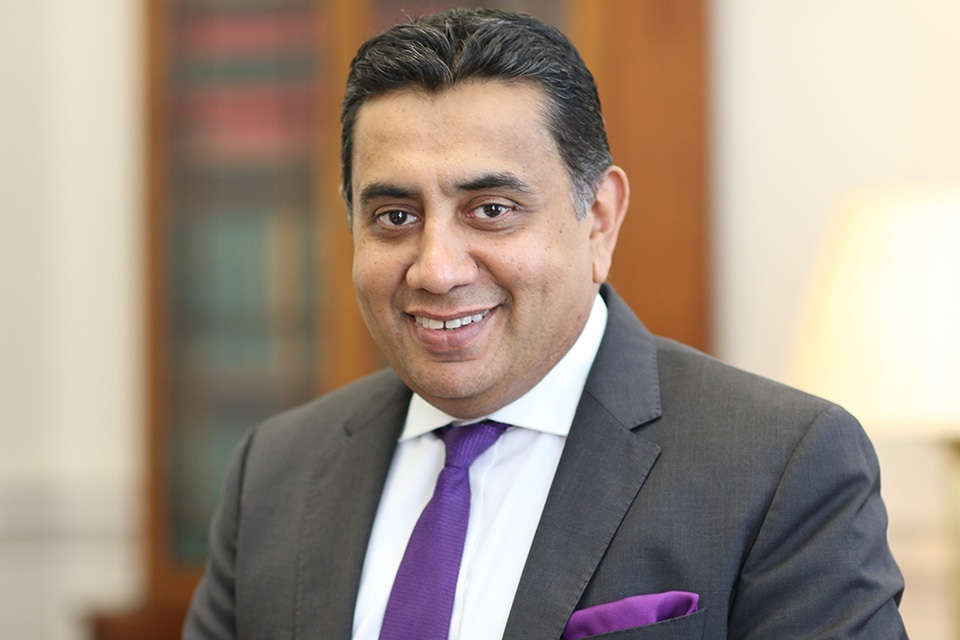UN Human Rights Council 45: UK's closing statement
Lord Ahmad of Wimbledon welcomes conclusions of the 45th Session of the UN Human Rights Council.

The 45th session of the Human Rights Council came to a close on Wednesday 7 October, adopting important resolutions on Belarus, Syria, Yemen, and other pressing situations. It is a credit to both the HRC President and Secretariat that, despite the limitations presented by the COVID-19 pandemic, the Council was again able to conduct its business smoothly in a hybrid format.
COVID-19 continues to provide the greatest challenge to the international community, and we must continue in our efforts to work together to mitigate the disruption it presents. Yet it is as vital as ever that states continue to meet their human rights obligations, and that we work together to combat the many different challenges the pandemic poses to the promotion and protection of human rights across the globe.
The UK delivered a national statement setting out our serious concerns about the situation in Belarus. The UK does not accept the results of the rigged presidential election. We have condemned the violence and intimidation by the Belarusian authorities towards peaceful protestors, journalists and opposition figures. The abduction, arrest, detention and forced exile of opposition members is unacceptable and must be reversed. We are appalled that Belarus has issued an arrest warrant for Svetlana Tikhanovskaya.
We call on Belarus to immediately lift restrictions on freedoms of expression, association and peaceful assembly, including against independent media and the curtailment or suspension of the Internet. We call on Belarus to engage constructively with the Moscow Mechanism, the Organisation for Security and Co-operation in Europe (OSCE) independent investigation into electoral fraud and human rights violations, and implement any recommendations. The UK is working with our international partners to promote a peaceful resolution to the crisis and hold those who have committed human rights violations to account.
I was pleased to personally deliver a UK statement in the general debate on serious human rights situations that require the Council’s attention which in this session focussed entirely on China’s human rights violations. The statement underscores our grave concerns about the compelling evidence of systematic human rights violations in Xinjiang, recent developments in Hong Kong, and continuing restrictions on media freedom in China. The UK also hosted a virtual side event, co-sponsored by Australia and Canada, on the National Security Law in Hong Kong. During the event the UK explained its assessment that the National Security Law is a serious breach of the Sino-British Joint Declaration, and represents a direct threat to the rights and freedoms of the people of Hong Kong.
I welcome the Council’s adoption of the two resolutions on Yemen and the renewal of the mandate for the Group of Eminent Experts, which is an important mechanism for promoting human rights in Yemen. I urge the parties to the conflict to cooperate with the Group. The UK fully supports the efforts of UN Special Envoy, Martin Griffiths, and we urge the Yemeni parties to agree to the proposed Joint Declaration urgently as a political settlement remains the only way to bring stability to Yemen.
I am pleased that the Council has once again adopted a resolution on Syria. The Commission of Inquiry reports that the human rights situation there remains grave. The resolution highlights the Commission’s latest findings which include the Syrian regime’s continued use of enforced disappearance, torture and sexual violence as a State policy. It is right that the resolution mandates the Commission to provide an assessment of the recurrent human rights concerns during this conflict. As we approach the tenth anniversary of the conflict, the plight of the Syrian people will not be forgotten.
Sudan has made welcome progress on a range of human rights issues, building on 2019 commitments as it transitions to democracy. That includes legal reforms on women and children’s rights, and de-criminalisation of apostasy. As Sudan delivers these important changes, challenges remain however, particularly in the conflict areas. Therefore, I am pleased that the UK has co-sponsored the Sudan resolution. Cooperation between the Government of Sudan and OHCHR will be important in supporting Sudan to fully meet its human rights obligations.
I welcome the Council’s adoption of a resolution on continuing threats to human rights in Somalia, especially persistent insecurity; the marginalisation of displaced people, minorities, and women; continuing sexual and gender-based violence; and restrictions on freedom of expression. The resolution also highlights worrying developments such as the triple threat of Covid-19, flooding and locusts; and the ‘Sexual Intercourse Bill’, where I echo the call for Somali lawmakers to instead consider a bill that is compliant with Somalia’s international obligations on the protection of children, women and girls.
I am also extremely pleased that, in a first for the Commonwealth, the UK, in its capacity as Chair in Office, was able to deliver a statement at the Human Rights Council on behalf of all 54 member states, the first time this group has addressed the Council collectively.
I also welcome the adoption of important resolutions on the concerning human rights situations in Burundi, Venezuela and the Philippines, and on the safety of journalists.
The international community must continue to stand up for the preservation of universal human rights and freedoms, to improve the lives of all people, throughout the world. As we take up our seat on the council for the 2021-23 term, the UK remains resolutely committed to this cause.
We will continue in our efforts to advance its invaluable work, and to deliver on our pledges to promote girls’ education, work to end violence against women and girls, protect media freedom and freedom of religion and belief, and bolster democratic values.